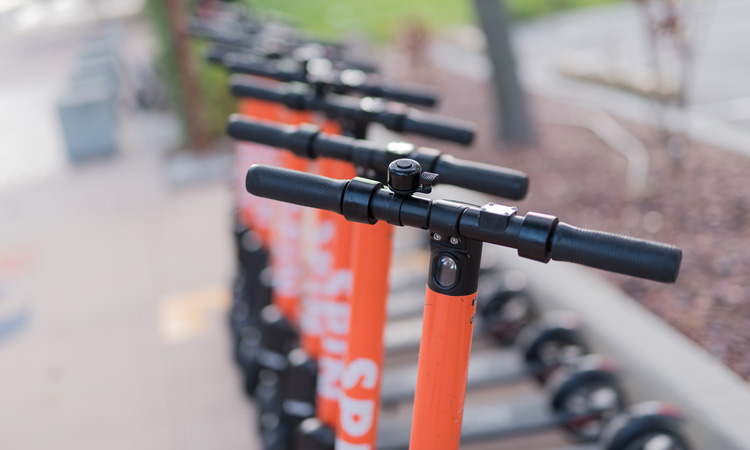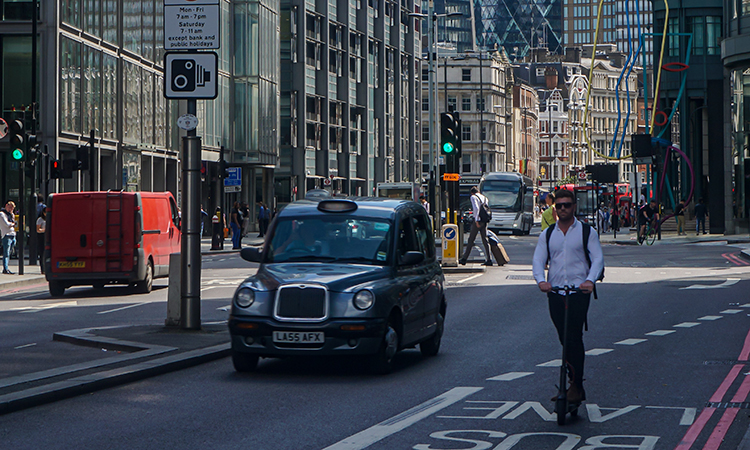Tackling common concerns about e-scooters head on
- Like
- Digg
- Del
- Tumblr
- VKontakte
- Buffer
- Love This
- Odnoklassniki
- Meneame
- Blogger
- Amazon
- Yahoo Mail
- Gmail
- AOL
- Newsvine
- HackerNews
- Evernote
- MySpace
- Mail.ru
- Viadeo
- Line
- Comments
- Yummly
- SMS
- Viber
- Telegram
- Subscribe
- Skype
- Facebook Messenger
- Kakao
- LiveJournal
- Yammer
- Edgar
- Fintel
- Mix
- Instapaper
- Copy Link
Posted: 29 December 2021 | Steve Pyer - Spin | No comments yet
Steve Pyer of Spin outlines some common problems e-scooters can cause and offers some core solutions for micro-mobility providers.


Public hire e-scooters have been considered as a reliable, inexpensive and sustainable mode of transport for many years now around the world. In today’s post-pandemic world, they’re ideal for short journeys that are too far to walk and are a more attractive, socially distanced option compared to other modes of public transport.
The UK is one of the last European countries that is yet to make a decision on the legalisation of these vehicles and preparations for this are well under way. The Department for Transport’s (DfT) public hire e-scooter trials commenced 18 months ago and marked the first time people have been able to adopt a new mode of transport since the introduction of the car 100 years ago.
Today, there are many more platforms for local communities and organisations representing vulnerable groups to voice their concerns, which means key stakeholders can quickly address them. Discussions via these platforms typically centre around the safety of e-scooter riders and pedestrians, as well as issues with e-scooter parking and anti-social behaviour.
Recent research by road safety organisation RoSPA has highlighted the need for more e-scooter education within local communities. This includes clearer distinction between privately-owned e-scooters and public-hire e-scooters schemes run by companies like Spin, which are licenced by and working very closely with local authorities.
These issues are the reason why it’s imperative that we talk about the barriers to success and share learnings from our operations in Essex and Milton Keynes to improve public hire e-scooter schemes across the UK. Ultimately e-scooter rental companies are all working towards the same goal – to create a future in which e-scooters operate cohesively within communities and become integrated into local transport choices.
Ongoing e-scooter safety measures
In our experience over the last 18 months in the UK and from our international operations, we find that private and public hire e-scooters (and their riders) often get tarred with the same brush. But the stats tell a different story[1]. They tell us that most accidents happen on unrestricted and unregulated privately-owned e-scooters which are illegal to ride on public roads in the UK. Of course, risks still exist with public hire e-scooters but the perception that they are one of the same needs to be changed.
E-scooter education is baked-in to public hire schemes. This includes multiple touch points that reiterate location, speed, age, parking and pavement restrictions and other technologies and best practices such as geofencing technology, in-app notifications and rider penalties to ensure safety rules are observed.
The safety of riders and pedestrians is the priority for all e-scooter rental companies, and we work with local authorities and residents to tailor schemes to their unique infrastructure and ensure safe riding and parking is adhered to.
With public hire schemes, safety measures take place well before a rider even sets off on a journey. Compulsory training modules are built into the apps used to unlock and pay for the scooters which cover all areas of riding and parking, including rider etiquette and awareness of vulnerable pedestrian groups.
This in-app training is supplemented with a more hands-on approach to safety education, through in-person demonstrations and safety courses which are a great way for riders to learn and ask questions all with a focus on reducing the risk of serious incidents. In our experience, running a mixture of full-safety courses, short ‘how-to-rides’ and proactive conversations around safety is the best way to encourage riders to engage with this important information. We urge every provider to host these sessions across the UK, with consistent content, so they are accessible to all riders.


E-scooter trials have been in place across the UK in the last 18 months
Building in restrictions
Unlike private e-scooters, public hire e-scooter operators have much more control over their use, to enforce road laws and to make tweaks on the go as we progress with the trials. For example, earlier this summer, local authorities asked us to reconsider the legal maximum speed of 15.5 mph due to some concerns from local residents and community groups. We took that on board and at the click of a button have reduced max speed to 12.5mph across all of our markets.
Creating a transport infrastructure that successfully integrates e-scooters is also about engineering an environment that prioritises the protection of vulnerable road users. Public hire e-scooter companies have been doing this from the start, for example, implementing no-go zones and speed restricted zones in shared spaces. We are reliant on Highways teams to change the urban environment to prioritise micro-mobility in segregated spaces. .
One of the biggest priorities is reinforcing the education of our users that they shouldn’t ride e-scooters on pavements. We’ve started rolling out an artificial intelligence (AI) technology on our fleets in the US already, which nudges riders to the appropriate behaviour by giving clearly audible warnings about being on the pavement and automatically reducing the scooter speed to a crawl, until the scooter is back on the correct surface area. With the help of technologies like this, e-scooter companies can mitigate risk and better protect pedestrians.
Overcoming parking problems
Incorrectly parked e-scooters can rightly frustrate local residents and vulnerable road users. Over the course of the trials, public hire providers are adapting their operations and looking for effective ways to mitigate this. Fixed parking infrastructure is increasingly being used to control where the scooters are parked.
Communities are able to report inappropriately parked scooters through the relevant e-scooter provider’s app so they can be quickly adjusted. In Essex, we are working with several partners who are constantly on patrol to re-park e-scooters if needed and educate the community on how the app and the service works and how to ride safely.
In areas where our operations managers, ambassadors and the community frequently reported issues we’ve implemented no parking zones, no ride zones and go-slow zones. Our system prevents riders from ending their trip in a no-parking zone and they must continue to a location where parking is permitted.
Councils and e-scooter rental firms are also exploring ways to create specific parking locations in cities. Parking bays could be physical docks or hubs such as those used for public bike hire schemes, and those we already have installed in Milton Keynes, or brightly marked out areas that will encourage riders to park in safer areas and guide them to make the right choices when parking.
New technology is also being developed to help prevent unhelpful parking. Some providers are exploring AI tools that will require a rider to take a picture of the e-scooter they just parked to prove it is parked appropriately, which the technology will quickly confirm.
Community is key
The key to optimising services to local needs and responding to resident concerns is open and regular dialogue with the local community and advocacy groups, listening to their feedback and taking necessary action. A blanket approach to solving common concerns across the whole UK won’t work. Instead, we must tailor local services to the needs and nuances of each local community. Together we can create a future in which e-scooters operate cohesively within communities and become integrated in the best way possible with our everyday lives.
References
[1]https://www.gov.uk/government/statistics/reported-road-casualties-great-britain-e-scooter-factsheet-2020/reported-road-casualties-great-britain-e-scooter-factsheet-2020
Biography
Steve Pyer is Spin’s UK & Ireland Country Manager, bringing over 15 years of experience within the micro-mobility sector. He joined Spin in September 2020 and is responsible for managing Spin’s operations and stakeholder relationships within the UK. Prior to Spin, Steve was General Manager at Madrid-based MaaS company, Ride On.
Related topics
Multimodality, On-Demand Transport, Security & Crime, Vehicle & Passenger Safety
Related modes
Bikes & Scooters







